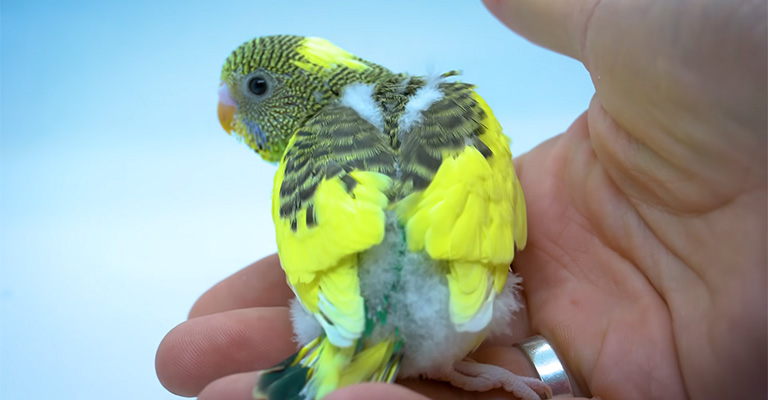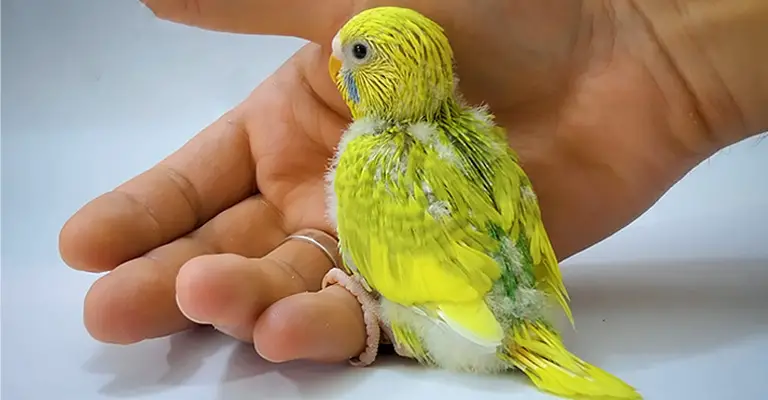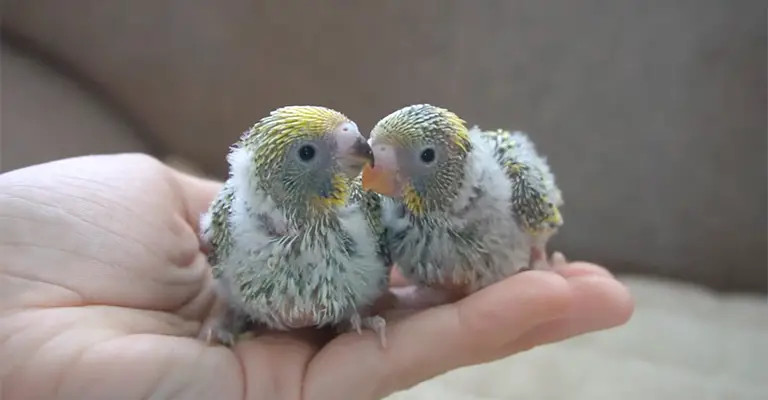The journey of baby budgies from hatchlings to independent fledglings is a fascinating process that raises questions about the optimal time for their separation from their parents.
This delicate transition involves not only physical readiness but also considerations of social development and overall well-being. As these young avian companions evolve, a critical question emerges:
When can baby budgies be separated from their parents? This exploration delves into the multifaceted factors that determine the right time for this separation, focusing on the stages of growth, self-sufficiency, and the interplay between parent-offspring dynamics.

When Can Baby Budgies Be Separated from Their Parents?
Separating baby budgies from their parents requires careful consideration to ensure their well-being and successful transition.
Here are some situations that indicate when it might be appropriate to separate them:
Weaning Stage
Baby budgies can be separated from their parents around 6 to 8 weeks of age when they start showing increased independence and are actively eating on their own.
At this point, they have learned essential skills from their parents and are ready to begin their individual journeys.
Feather Development
When baby budgies have fully developed feathers and appear capable of maintaining their body temperature without relying on their parents for warmth, it’s a sign that they are physically ready for separation.
Eating Habits
If you observe that the baby budgies are consistently eating a variety of solid foods and drinking water independently, it indicates their ability to sustain themselves and suggests they are ready to be separated.
Socialization
Baby budgies tend to become more curious and explore their surroundings as they grow. If they are confidently interacting with their cage mates or toys and seem less reliant on parental attention, it may be an appropriate time to consider separation.
Parental Aggression
In some cases, parent budgies might become aggressive towards their offspring as they mature. If you notice signs of aggression or stress from the parents towards the babies, it could be a signal to separate them to prevent harm.
Cage Space
When the cage or enclosure becomes crowded due to the growing number of birds, it’s a practical reason to consider separating the baby budgies. Sufficient space ensures each bird can thrive without excessive competition.
Health Monitoring
Regularly monitoring the health of both the parent budgies and their offspring is crucial. If there are concerns about disease transmission or the overall health of the family, separating the babies can help prevent potential issues.
In each of these situations, the key is to ensure that the baby budgies have reached a stage of development where they can confidently feed, regulate their body temperature, and interact with their environment.
Separating them at the right time promotes their independent growth and helps them adapt to their new circumstances more effectively.
What Are Baby Budgie’s Growth Stages?

The baby budgie growth stages are the different phases of development that budgie chicks go through from hatching to adulthood.
Here are some stages, along with some descriptions of each point:
Hatchling Stage
This is the first stage, where the budgie chicks have just hatched from the egg. They are pink in color, featherless, blind, and deaf.
They are completely helpless and depend on their mother to feed them and keep them warm. This stage lasts for about 7 to 10 days.
Nestling Stage
This is the second stage, where the budgie chicks start to grow soft feathers and open their eyes.
They also begin to move around the nest and hold up their heads. They still rely on their parents for food, but they may also nibble on some seeds or pellets. This stage lasts for about 10 to 14 days.
Fledgling Stage
This is the third stage, where the budgie chicks grow pin feathers and full feathers. They also start to explore their environment and interact with other birds or objects.
They may flutter and hop, but they cannot fly yet. They begin to wean from their parents and eat solid foods on their own. This stage lasts for about 14 to 21 days.
Weanling Stage
This is the fourth stage, where the budgie chicks develop flight feathers and learn to fly. They also become more independent and confident and may show signs of aggression or territoriality towards their parents or siblings.
They can eat a variety of foods, such as fresh fruits and vegetables, cuttlebone, and millet spray. This stage lasts for about 21 to 28 days.
Juvenile Stage
This is the fifth stage, where the budgie chicks have reached their adult size and weight, but they still have some baby features, such as a striped cap or a black eye ring.
They also have a solid color on their feathers, which may change later when they moult.
They are fully weaned and can fly well, but they still need some guidance and socialization from their parents or other birds. This stage lasts for about 28 to 35 days.
Subadult Stage
This is the sixth stage, where the budgie chicks undergo their first moult and change their appearance. They lose their baby features and develop adult features, such as a clear cap or an iris ring.
They also may change their feather colour or pattern depending on their genetics and environment.
They are mature enough to leave their parents and join a new flock or pair up with a mate. This stage lasts for about 35 to 42 days.
Adult Stage
This is the final stage, where the budgie chicks have completed their growth and development and become fully-fledged adults.
They have a stable weight and health and a distinctive personality and voice. They can breed and raise their own chicks if they are given the right conditions and care. They can live up to 10 years or more in captivity.
What are the Risks to Consider Before Baby Budgies Leave Their Nest?

Baby budgies are delicate creatures, and sometimes, there’s a lot that can go wrong before they leave their nests.
Some of the common risks include:
Starvation
Budgies instinctively know how to rear their baby chicks, but some aren’t good parents. They may neglect or abandon their chicks or fail to provide them with enough food.
Starvation can cause the chicks to become weak, thin, or dehydrated. It can also affect their growth and development or even lead to death.
Infection
Budgies are susceptible to various infections that can affect their health and well-being. Some of the common infections that can affect budgie chicks are psittacosis, candidiasis, avian pox, and avian influenza.
These infections can cause symptoms such as sneezing, coughing, wheezing, diarrhoea, vomiting, or loss of appetite.
Predation
Budgies are prey animals that face many threats from predators, such as cats, dogs, snakes, rats, or birds of prey. Predators can attack the budgie nest and harm or kill the parents or the chicks.
They can also scare or stress the budgies and make them abandon their nest or their young. Predation can reduce the survival rate and the reproductive success of the budgies.
Injury
Budgies can get injured by various causes such as accidents, fights, or self-mutilation. Accidents can happen when the budgies fly into windows, walls, or other objects or when they get trapped or tangled in wires, cords, or threads.
Fights can happen when the budgies compete for food, space, or mates or when they defend their territory or their young.
Stress
Budgies are sensitive animals that can get stressed by various factors such as noise, temperature, lighting, predators, illness, injury, loneliness, or change of routine. Stress can affect the budgies’ appetite, mood, behaviour, and energy level.
It can also affect their parenting skills and their bond with their chicks. Stress can lead to overeating or under-eating, aggression or depression, feather plucking or biting, or reduced immunity or fertility in the budgies.
Malnutrition
Budgies need a balanced diet that provides them with all the nutrients they need for their health and growth. A balanced diet for budgies should include pellets, fresh fruits and vegetables, and occasional treats.
Pellets are specially formulated to provide all the nutrients that budgies need. Fruits and vegetables are rich in antioxidants, fibre, and water.
Genetic Defects
Budgies can inherit genetic defects from their parents that can affect their appearance or health. Some of the common genetic defects that can affect budgie chicks are albinism, splay legs, running syndrome, feather dusters, or French moult.
These defects can cause abnormalities such as lack of pigment, crooked legs, stunted growth, excessive feathering, or feather loss.
Overcrowding
Budgies need enough space to fly, perch, climb, and explore. They also need enough space to nest, breed, and raise their young.
Overcrowding can occur when there are too many budgies in a cage or a room that is too small or too cluttered for them.
Human Intervention
Budgies are wild animals that have been domesticated for human companionship and entertainment. Human intervention can have positive or negative effects on the budgies and their chicks.
Positive effects include providing them with food, water, shelter, care, and stimulation. Negative effects include disturbing them, handling them, separating them, or removing them from their natural environment or behavior.
FAQ
Baby budgies are typically ready for separation around 6 to 8 weeks of age. This is when they start eating solid foods, have developed feathers, and show increased independence.
Signs include active self-feeding, well-developed feathers, and confident exploration of their environment. These indicate they can regulate their temperature and sustain themselves.
It’s best to wait until 6 weeks or later to ensure proper physical and social development. Separating too early can impact their health and social skills.
In cases of parental aggression or health concerns, early separation might be necessary. However, it’s generally advisable to wait until they’re closer to 6 weeks for their well-being.
Separation from parents is a natural step for budgies’ growth. When they start showing independence and interacting with cage mates, it indicates they’re socially ready for the transition.
Conclusion
In the intricate dance of nature, the timing of separating baby budgies from their parents emerges as a pivotal point that shapes their trajectory of growth and independence.
Striking a balance between physical maturation, self-sufficiency, and social dynamics is crucial in ensuring a seamless transition. Each budgie’s unique development must be considered, recognizing the signs of readiness like weaning, feather growth, and social interactions.
By carefully observing these factors, we empower these young birds to embark on their individual journeys, fostering their confidence and ability to adapt to their changing environment.
Through this process, we witness not just the growth of individual budgies but also the intricate beauty of life’s stages and the profound connection between these charming companions and their caregivers.